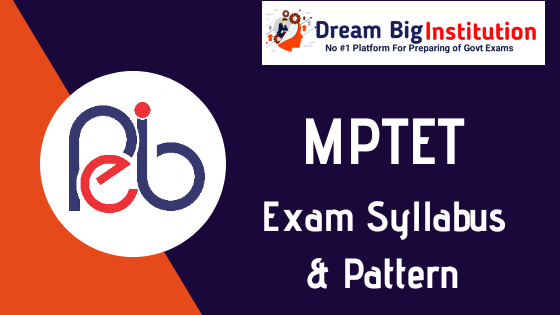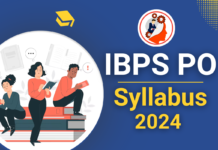Table of Contents
MPTET Syllabus and Exam Pattern 2020
Madhya Pradesh Professional Examination Board (MPPEB) has released a notification regarding MP Primary School Teacher Eligibility Test – 2020. MPTET registration will start from 6th January 2020 till 20th January 2020. All the eligible candidates can apply through their official website.
Examination Pattern of MPTET 2020:
Structure and Content (All Compulsory):
| S.No. | Subjects | No. of Questions | Marks |
|---|---|---|---|
| 1 | Child Development and Pedagogy | 30 | 30 |
| 2 | Language I (compulsory) | 30 | 30 |
| 3 | Language II (compulsory) | 30 | 30 |
| 4 | Mathematics | 30 | 30 |
| 5 | Environmental Studies | 30 | 30 |
| Total | 150 | 150 |
Examination Schedule:
| Exam Date | Exam Shift | Timing | Total Timing |
| Start from 25th April 2020 | Ist | 9 AM to 11:30 AM | 2:30 Hrs |
| IInd | 2 PM to 4:30 PM | 2:30 Hrs |
Syllabus of MPTET 2020:
MPTET Primary (for classes I to V) Primary Stage:
- Child Development and Pedagogy – 30 Questions
- a) Child Development – 15 Questions
- Concept of development and its relationship with learning
- Principles & Factors affecting of the development of children
- Child Mental Health & behavior related issues
- Influence of Heredity & Environment
- Socialization processes: Social world & children (Teacher, Parents, Peers)
- Piaget, Pavlov, Thorndike and Kohlberg: constructs and critical perspectives
- Concepts of child-centered and progressive education
- Critical perspective of the construct of Intelligence
- Multi-Dimensional Intelligence
- Personality & its measurement
- Language & Thought
- Gender as a social construct; gender roles, gender-bias and educational practice
- Individual differences among learners, understanding differences based on diversity of language, caste, gender, community, religion, etc.
- The distinction between Assessment for learning and assessment of learning;
- School-Based Assessment, Continuous & Comprehensive Evaluation: perspective and practice
- Formulating appropriate questions for assessing readiness levels of learners; for enhancing learning and critical thinking in the classroom and for assessing learner achievement.
- b) Concept of Inclusive education and understanding children with special needs – 5 Questions
- Addressing learners from diverse backgrounds including disadvantaged and deprived
- Addressing the needs of children with learning difficulties, ‘impairment’ etc.
- Addressing the Talented, Creative, Specially abled Learners
- Problematic Child: Identify & their diagnose aspects.
- Child Crime: Causes & its types
- c) Learning and Pedagogy – 10 Questions
- How children think and learn; how and why children ‘fail’ to achieve success in school performance.
- Basic processes of teaching and learning; children’s strategies of learning; learning as a social activity; social context of learning.
- Child as a problem solver and a ‘scientific investigator’ Alternative conceptions of learning in children, understanding children’s ‘errors’ as significant steps in the learning process.
- Cognition & Emotions
- Motivation and learning
- Factors contributing to learning – personal & environmental
- Guidance & Counselling
- Aptitude & its measurement
- Memory & Forgetfulness
- Language I Hindi – 30 Questions
- a) भाषायी समझ/अवबोध – 15 Questions
- भाषायी समझ/ अवबोध के लिए दो अपठित गद्यांश :एक गद्यांश (नाटक/ एकांकी/ घटना/ निबंध/ कहानी/ आदि से) तथा दूसरा अपठित पद्य |
- b) भाषायी विकास हेतु निर्धारित शिक्षा शास्त्र- 15 Questions
- भाषा सीखना और ग्रहणशीलता
- भाषा शिक्षण के सिद्धान्त
- भाषा शिक्षण में सुनने, बोलने की भूमिका, भाषा के कार्य, बच्चे भाषा का प्रयोग कैसे करते हैं
- मौखिक और लिखित अभिव्यक्ति अन्तर्गत भाषा सीखने में व्याकरण की भूमिका
- भाषा शिक्षण में विभिन्न स्तरों के बच्चों की चुनौतियाँ, कठिनाइयाँ, त्रुटियाँ एवं क्रमबद्धता
- भाषा के चारों कौशल (सुनना, बोलना, पढ़ना, लिखना) का मूल्यांकन
- कक्षा में शिक्षण अधिगम सामग्री, पाठ्यपुस्तक, दूरसंचार (दृश्य एवं श्रव्य) सामग्री, बहुकक्षा स्रोत
- पुनः शिक्षण
III. Language English II – 30 Questions
- a) Comprehension – 15 Questions
- Two unseen prose passages (discursive or literary or narrative or scientific) with a question on comprehension, grammar and verbal ability
- b) Pedagogy of Language Development – 15 Questions
- Learning and acquisition
- Principles of Second Language Teaching
- Role of listening and speaking; function of language and how children use it as a tool
- The role of grammar in learning a language for communicating ideas verbally and in written form;
- Challenges of teaching language in a diverse classroom; language difficulties, errors and disorders
- Language Skills
- Evaluating language comprehension and proficiency: speaking, listening, reading and writing
- Teaching-learning materials: Textbook, multi-media materials, multilingual resource of the classroom
- Remedial Teaching
IV Mathematics – 30 Questions
- a) Content – 15 Questions
- Geometry
- Shapes & Spatial Understanding
- Solids around Us
- Number System
- Addition and Subtraction
- Multiplication
- Division
- Fractions
- Measurement
- Weight
- Time
- Volume
- Data Handling
- Patterns
- Money
- b) Pedagogical issues – 15 Questions
- Nature of Mathematics/Logical thinking; understanding children’s thinking and reasoning patterns and strategies of making meaning and learning
- Place of Mathematics in Curriculum
- Language of Mathematics
- Community Mathematics
- Evaluation through formal and informal methods
- Problems of Teaching
- Error analysis and related aspects of learning and teaching
- Diagnostic and Remedial Teaching
- New methods for teaching Maths in class
- Environmental Studies – 30 Questions
- a) Content – 20 Questions
- Family and Friends: Relationships, Natural Resources, Animals, Plants
- Food & habits
- Shelter
- Water & Air pollution
- Space Science
- Things We Make and Do
- Work and Play
- Natural Things & Yield
- b) Pedagogical Issues – 10 Questions
- Concept and scope of EVS
- Significance of EVS integrated EVS
- Environmental Studies & Environmental Education
- Scope & relation to Science & Social Science
- Approaches of presenting concepts & activities
- Formula & Responsibility of Environmental Studies
- Tours, Experimentation/Practical Work and their importance
- Learning through debate, Discussion, Group teaching and presentation
- CCE
- Teaching material/Aid
- Problems
MPTET Syllabus and Exam Pattern 2020
Cut- Off / Qualifying Marks and Award of MPTET Certificate:
The candidates appearing in MPTET will be issued Marks Statement. The Candidates securing 60% for General and 50 % for OBC/SC/ST/Differently Abled Person will be issued Eligibility Certificate.
Validity of MPTET Certificate:
The Validity Period of MPTET qualifying certificate for appointment will be 2 years for all categories. There is no restriction on the number of attempts, a person can take for acquiring a MPTET Certificate. A person who has Qualified MPTET may also appear again for improving his/her score.
You May Also Check:
- Monthly Current Affairs MCQ 2019 For All Competitive Exams
- Daily Current Affairs Quiz
- Monthly Important Days and Date (Jan to December) for All Competitive Exam
- Banking Awareness
- Computer Awareness
- Insurance Awareness
- Daily The Hindu Editorial Vocabulary
- Latest Job Notification
- Exam Syllabus and Exam Pattern
- Exam Analysis
- Premium Practice Sets
- Previous Years Papers
- Important Study Materials
You May Also Like Some of Our Best E-Books & Practice Sets
- Quadratic Equation PDF With Solution for All Bank Exam
- English Practice Book PDF Notes For SBI Clerk Prelims
- Economic Questions For RRB NTPC, SSC, UPSC Exam
- 40+ RRB NTPC Officials Exam Paper PDF Hindi and English
- Ratio and Proportion Practice Questions For All Exams
- Reasoning New Pattern Coding-Decoding
- RRB NTPC Arithmetic Practice Set in Hindi And English
- RRB NTPC Physics Questions General Science
- 300+ Haryana GK One Liner Capsules For HSSC HTET HPSC and Other Exams
- 100+Puzzles for RRB PO and Clerk Exam PDF Download Now
- Quadratic Equation PDF With Solution for All Bank Exam
| To Join us |
Click Here |
| To Join us |
Click Here |
| To Join us |
Click Here |
India’s Most Affordable Premium Practice Set













